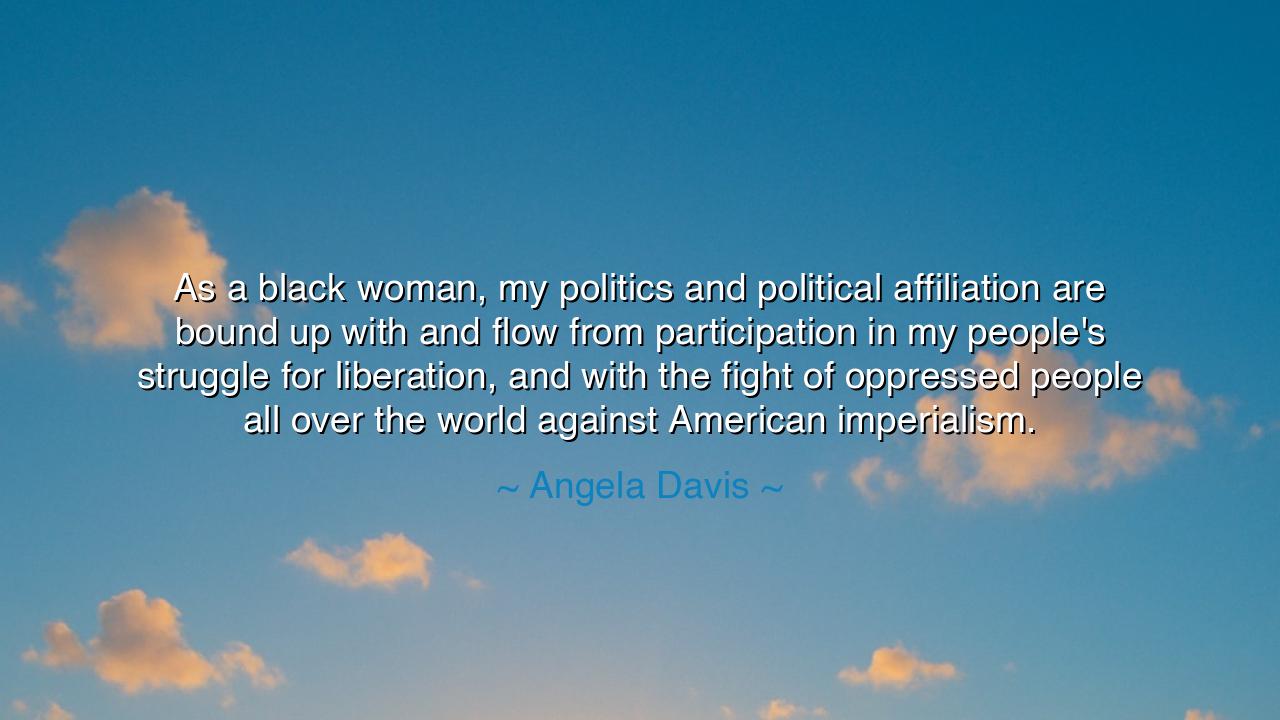
As a black woman, my politics and political affiliation are
As a black woman, my politics and political affiliation are bound up with and flow from participation in my people's struggle for liberation, and with the fight of oppressed people all over the world against American imperialism.






Hear, O seekers of justice, the voice of Angela Davis, who spoke with the authority of struggle and the fire of resistance: “As a black woman, my politics and political affiliation are bound up with and flow from participation in my people’s struggle for liberation, and with the fight of oppressed people all over the world against American imperialism.” In these words lies the union of identity and destiny, where the personal becomes inseparable from the collective, and where one woman’s voice joins the chorus of the oppressed.
For Davis does not speak of politics as mere party or policy, but as lived reality. As a Black woman, her life is already politicized by a world that has sought to silence, subdue, and erase. Thus, her commitment arises not from convenience but from necessity. Her affiliation is not with power for its own sake, but with the eternal struggle of her people to breathe freely, to live with dignity, to claim their rightful inheritance of liberty.
The story of Davis is rooted in the long fight for liberation. She was imprisoned, hunted, and vilified for her radical beliefs, yet she never abandoned her cause. Her struggle mirrors that of countless freedom fighters before her—Harriet Tubman leading enslaved people to freedom, Sojourner Truth declaring “Ain’t I a Woman?”, and Martin Luther King Jr. proclaiming justice as the soul of America. In each of these, the battle was not individual but collective, bound up with the fate of a people.
Yet Davis’s words reach beyond her own nation. She names the fight of oppressed people all over the world as her own, for she saw that chains forged in one land echo across all others. In Vietnam, in South Africa under apartheid, in Palestine, in Latin America—wherever people suffered under the shadow of imperialism, Davis declared solidarity. For oppression knows no borders, and so too must resistance cross boundaries of race, language, and nation.
Therefore, let this wisdom endure: true politics is not ambition, but solidarity. The measure of our struggle is not in what we gain for ourselves alone, but in how we join with others in their fight for freedom. Angela Davis teaches that liberation is indivisible: until all are free, none are free. And so her words are both a testimony and a charge—that we too must bind our lives to the cause of justice, and let the cry of the oppressed everywhere become the compass of our action.






CQChi Quynh
Angela Davis’s statement is both personal and political, showcasing how identity and activism are intertwined. But I also wonder how those who have not experienced the same historical struggles can better support movements for liberation. Is it enough to simply acknowledge these struggles, or must we engage more directly? What steps can people take to understand and advocate for global movements without appropriating the experiences of those most affected?
Nnguyentunglam
The way Angela Davis ties her political identity to the broader fight for global liberation is thought-provoking. She’s calling for an understanding of politics that transcends national borders. But how do we, as individuals, translate this global perspective into meaningful action within our own communities? Can we bring this sense of interconnectedness to everyday political decisions and create more widespread awareness of international struggles?
MATRAN MAI ANH
Angela Davis’s perspective highlights the importance of understanding oppression in global terms, particularly in relation to American imperialism. It also raises the question of how effective political movements can be when they fight against not only domestic systems of oppression but also international forces. How can movements in one country amplify their efforts through collaboration with others? What are the challenges to global solidarity in this context?
QKDoan Quoc Khanh
Davis speaks to the global nature of oppression, linking the fight for Black liberation with struggles worldwide. It makes me ask: How can political movements in one country, like the U.S., support movements in other countries dealing with imperialism? Are there ways that international solidarity can be more effective in pushing back against these systemic forces? Can we build more powerful coalitions that extend beyond borders?
QAQuynh Anh
This quote emphasizes how political identity is shaped by personal and collective histories. It makes me think about how people’s political beliefs often stem from their lived experiences and the struggles they’ve witnessed or been part of. But what does it mean for those who may not see themselves as directly oppressed—how can we ensure that all people engage with the fight against oppression, even if they don’t face it themselves?